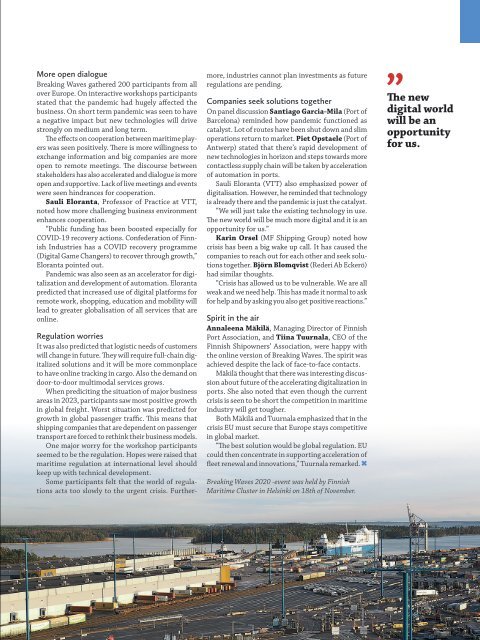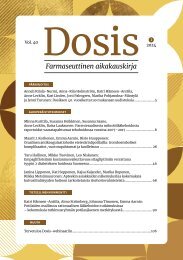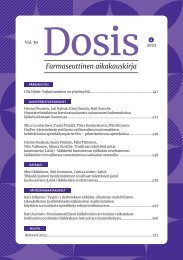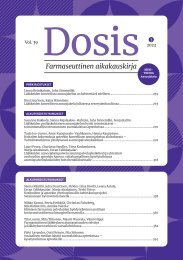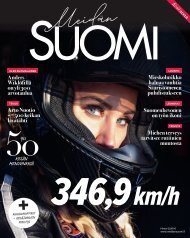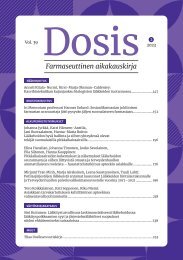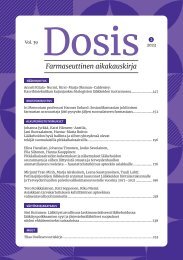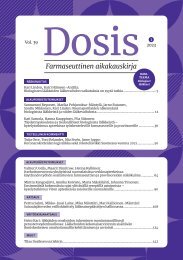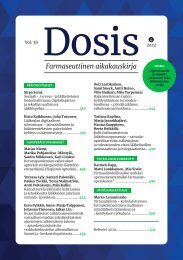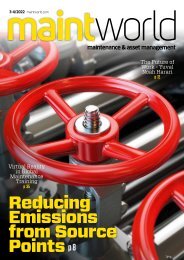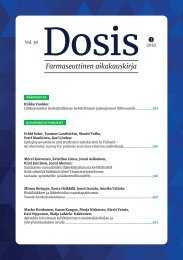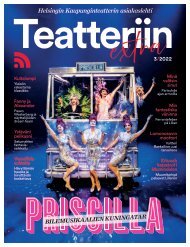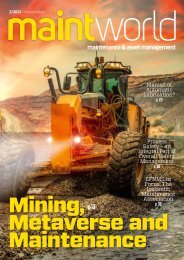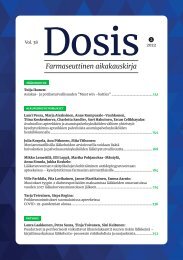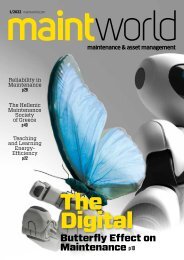You also want an ePaper? Increase the reach of your titles
YUMPU automatically turns print PDFs into web optimized ePapers that Google loves.
More open dialogue<br />
Breaking Waves gathered 200 participants from all<br />
over Europe. On interactive workshops participants<br />
stated that the pandemic had hugely affected the<br />
business. On short term pandemic was seen to have<br />
a negative impact but new technologies will drive<br />
strongly on medium and long term.<br />
The effects on cooperation between maritime players<br />
was seen positively. There is more willingness to<br />
exchange information and big companies are more<br />
open to remote meetings. The discourse between<br />
stakeholders has also accelerated and dialogue is more<br />
open and supportive. Lack of live meetings and events<br />
were seen hindrances for cooperation.<br />
Sauli Eloranta, Professor of Practice at VTT,<br />
noted how more challenging business environment<br />
enhances cooperation.<br />
“Public funding has been boosted especially for<br />
COVID-19 recovery actions. Confederation of <strong>Finnish</strong><br />
Industries has a COVID recovery programme<br />
(Digital Game Changers) to recover through growth,”<br />
Eloranta pointed out.<br />
Pandemic was also seen as an accelerator for digitalization<br />
and development of automation. Eloranta<br />
predicted that increased use of digital platforms for<br />
remote work, shopping, education and mobility will<br />
lead to greater globalisation of all services that are<br />
online.<br />
Regulation worries<br />
It was also predicted that logistic needs of customers<br />
will change in future. They will require full-chain digitalized<br />
solutions and it will be more commonplace<br />
to have online tracking in cargo. Also the demand on<br />
door-to-door multimodal services grows.<br />
When prediciting the situation of major business<br />
areas in 2023, participants saw most positive growth<br />
in global freight. Worst situation was predicted for<br />
growth in global passenger traffic. This means that<br />
shipping companies that are dependent on passenger<br />
transport are forced to rethink their business models.<br />
One major worry for the workshop participants<br />
seemed to be the regulation. Hopes were raised that<br />
maritime regulation at international level should<br />
keep up with technical development.<br />
Some participants felt that the world of regulations<br />
acts too slowly to the urgent crisis. Furthermore,<br />
industries cannot plan investments as future<br />
regulations are pending.<br />
Companies seek solutions together<br />
On panel discussion Santiago Garcia-Mila (Port of<br />
Barcelona) reminded how pandemic functioned as<br />
catalyst. Lot of routes have been shut down and slim<br />
operations return to market. Piet Opstaele (Port of<br />
Antwerp) stated that there’s rapid development of<br />
new technologies in horizon and steps towards more<br />
contactless supply chain will be taken by acceleration<br />
of automation in ports.<br />
Sauli Eloranta (VTT) also emphasized power of<br />
digitalisation. However, he reminded that technology<br />
is already there and the pandemic is just the catalyst.<br />
“We will just take the existing technology in use.<br />
The new world will be much more digital and it is an<br />
opportunity for us.”<br />
Karin Orsel (MF Shipping Group) noted how<br />
crisis has been a big wake up call. It has caused the<br />
companies to reach out for each other and seek solutions<br />
together. Björn Blomqvist (Rederi Ab Eckerö)<br />
had similar thoughts.<br />
“Crisis has allowed us to be vulnerable. We are all<br />
weak and we need help. This has made it normal to ask<br />
for help and by asking you also get positive reactions.”<br />
Spirit in the air<br />
Annaleena Mäkilä, Managing Director of <strong>Finnish</strong><br />
Port Association, and Tiina Tuurnala, CEO of the<br />
<strong>Finnish</strong> Shipowners’ Association, were happy with<br />
the online version of Breaking Waves. The spirit was<br />
achieved despite the lack of face-to-face contacts.<br />
Mäkilä thought that there was interesting discussion<br />
about future of the accelerating digitalization in<br />
ports. She also noted that even though the current<br />
crisis is seen to be short the competition in maritime<br />
industry will get tougher.<br />
Both Mäkilä and Tuurnala emphasized that in the<br />
crisis EU must secure that Europe stays competitive<br />
in global market.<br />
“The best solution would be global regulation. EU<br />
could then concentrate in supporting acceleration of<br />
fleet renewal and innovations,” Tuurnala remarked. ✖<br />
Breaking Waves <strong>2020</strong> -event was held by <strong>Finnish</strong><br />
<strong>Maritime</strong> <strong>Cluster</strong> in Helsinki on 18th of November.<br />
”The new<br />
digital world<br />
will be an<br />
opportunity<br />
for us.<br />
7


